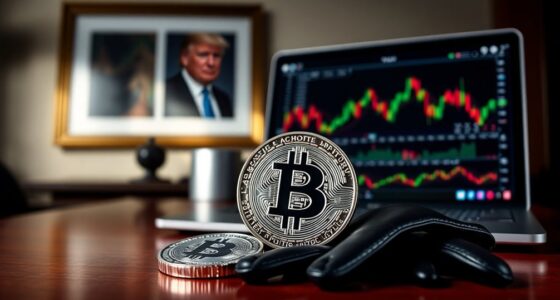As global regulators, particularly the IMF, tighten their grip on El Salvador's Bitcoin holdings, you might wonder how this will impact the country's bold cryptocurrency initiative. With mandates to halt public Bitcoin purchases and phase out the Chivo wallet, the focus is shifting towards transparency and financial stability. The implications of these changes raise critical questions about El Salvador's future in the crypto landscape and the broader effects on its economy. What's next for this ambitious experiment?

As global regulators scrutinize El Salvador's Bitcoin holdings, you're witnessing a pivotal moment in the intersection of cryptocurrency and national policy. The International Monetary Fund (IMF) has stepped in with strict requirements, mandating that El Salvador halt public Bitcoin purchases and phase out support for the Chivo wallet by July 2025. These moves aren't just regulatory formalities; they reflect serious concerns regarding the country's economic stability and the practicality of its Bitcoin adoption.
Transparency is a major focus. The Salvadoran government must disclose all Bitcoin holdings and provide audited financial reports for both Fidebitcoin and Chivo. These measures aim to ensure that the public has a clear view of the government's financial dealings, especially in a context where Bitcoin's legal tender status has raised eyebrows globally. You can see how these regulations are designed to protect consumers and stabilize the financial landscape in a nation struggling with economic hardships.
The Salvadoran government must ensure transparency by disclosing Bitcoin holdings and financial reports to safeguard consumer interests amidst economic challenges.
The challenges surrounding Bitcoin adoption in El Salvador are significant. While Bitcoin was made legal tender in September 2021, requiring businesses to accept it alongside the U.S. dollar, the adoption rate has been disappointingly low. Banks must navigate a complex regulatory framework that includes applying for permission to offer Bitcoin services and ensuring their operations are fully backed by Bitcoin funds. These hurdles indicate that even with a legal framework, practical integration into the financial system remains a daunting task.
Regulatory developments are ongoing, with the central bank releasing draft regulations that focus on the operational aspects of Bitcoin as a currency. However, recent legislative amendments could complicate the country's Bitcoin adoption strategy further. Financial institutions now face strict compliance requirements, and international scrutiny from financial authorities only adds pressure to conform to global standards.
The economic implications of these developments are profound. El Salvador's Bitcoin holdings, having reached 6,100 BTC valued at approximately $509 million, are caught in a complex web of rising debt and low adoption rates. The IMF's $1.4 billion loan comes with conditions aimed at minimizing Bitcoin's role in the economy, highlighting the financial risks associated with its use as legal tender.
As you observe these unfolding events, it's clear that El Salvador's experiment with Bitcoin could influence broader global attitudes toward cryptocurrencies. The scrutiny from organizations like the IMF and the World Bank underscores the critical importance of financial stability and consumer protection in the ever-evolving landscape of digital currencies.









